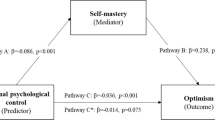Abstract
In a cross-sectional study of undergraduates and their parents we investigated parental correlates of three types of positive cognition related to mental and physical health outcomes: optimism, learned resourcefulness, and positive self-evaluation. The correlates were parental self-cognitions, parental approval and disapproval, and offspring's perception of parental approval and disapproval. Intergenerational effects were observed for learned resourcefulness and positive self-evaluation, but not for optimism. More parental approval was related to more positive self-attitudes in the offspring. For mothers, but not fathers, these relations were mediated by offspring's perceptions.
Similar content being viewed by others
References
Abramson, L. Y., Metalsky, G. I., & Alloy, L. B. (1989). Hopelessness depression: A theory-based subtype of depression.Psychological Review, 96, 358–372.
Andrews, B., & Brewin, C. R. (1990). Attributions for marital violence: A study of antecedents and consequences.Journal of Marriage and the Family, 52, 757–767.
Andrews, B., & Brown, G. W. (1993). Self-esteem and vulnerability to depression: Comparison of interview and questionnaire methodology.Journal of Abnormal Psychology, 102, 565–572.
Bandura, A. (1977). Self-efficacy: Toward a unifying theory of behavioral change.Psychological Review, 84, 191–215.
Bandura, A. (1986).Social foundations of thought and action: A social cognitive theory. Englewood Cliffs, NJ: Prentice-Hall.
Bargh, J. A. (1989). Conditional automaticity: Varieties of automatic influence in social perception and cognition. In J. S. Uleman & J. A. Bargh (Eds.),Unintended thought (pp. 3–51). New York: Guilford Press.
Brewin, C. R. (1988).Cognitive foundations of clinical psychology. London & Hove: Erlbaum.
Brewin, C. R., Andrews, B., & Gotlib, I. H. (1993). Psychopathology and early experience: A reappraisal of retrospective reports.Psychological Bulletin, 113, 82–98.
Brewin, C. R., Firth-Cozens, J., Furnham, A., & McManus, I. C. (1992). Self-criticism in adulthood and recalled childhood experience.Journal of Abnormal Psychology, 101, 561–566.
Brown, G. W., Andrews, B., Bifulco, A., & Veiel, H. (1990). Self-esteem and depression: 1. Measurement issues and prediction of onset.Social Psychiatry and Psychiatric Epidemiology, 25, 200–209.
Brown, G. W., Bifulco, A., & Andrews, B. (1990). Self-esteem and depression: 4. Effect on course and recovery.Social Psychiatry & Psychiatric Epidemiology, 25, 244–249.
Cantor, N., & Kihlstrom, J. F. (1987).Personality and social intelligence. Englewood Cliffs, NJ: Prentice-Hall.
Carver, C. S., & Gaines, J. G. (1987). Optimism, pessimism, and post-partum depression.Cognitive Therapy and Research, 11, 449–462.
Cooley, C. H. (1902).Human nature and the social order. New York: Scribner's.
Coopersmith, S. (1967).The antecedents of self-esteem. San Francisco: Freeman.
Dweck, C. S., & Licht, B. (1980). Learned helplessness and intellectual achievement. In J. Garber & M. E. P. Seligman (Eds.),Human helplessness (pp. 197–221). New York: Academic Press.
Felson, R. B. (1989). Parents and the reflected appraisal process: A longitudinal analysis.Journal of Personality and Social Psychology, 56, 965–971.
Felson, R. B., & Reed, M. (1986). The effect of parents on the self-appraisals of children.Social Psychology Quarterly, 49, 302–308.
Felson, R. B., & Zielinski, M. (1989). Children's self-esteem and parental support.Journal of Marriage and the Family, 51, 727–735.
Gecas, V. (1972). Parental behavior and contextual variations in adolescent self-esteem.Sociometry, 35, 332–345.
Gecas, V., & Schwalbe, M. L. (1986). Parental behavior and adolescent self-esteem.Journal of Marriage and the Family, 48, 37–46.
Hoffman, L. W. (1991). The influence of the family environment on personality: Accounting for sibling differences.Psychological Bulletin, 110, 187–203.
Jaenicke, C., Hammen, C., Zupan, B., Hiroto, D., Gordon, D., Adrian, C., & Burge, D. (1987). Cognitive vulnerability in children at risk for depression.Journal of Abnormal Child Psychology, 15, 559–572.
Jarrett, R. B., Giles, D. E., Gullion, C. M., & Rush, A. J. (1991). Does learned resourcefulness predict response to cognitive therapy in depressed outpatients?Journal of Affective Disorders, 23, 223–229.
Lewicki, P. (1986).Nonconscious social information processing. New York: Academic Press.
Lewinsohn, P. M., & Alexander, C. (1990). Learned resourcefulness and depression. In M. Rosenbaum (Ed.),Learned resourcefulness: On coping skills, self-control, and adaptive behavior (pp. 202–217). New York: Springer.
Markus, H., & Cross, S. (1990). The interpersonal self. In L. A. Pervin (Ed.),Handbook of personality: Theory and research (pp. 576–608). New York: Guilford Press.
Mead, G. H. (1934).Mind, self and society. Chicago: University of Chicago Press.
Needles, D. J., & Abramson, L. Y. (1990). Positive life events, attributional style, and hopefulness: Testing a model of recovery from depression.Journal of Abnormal Psychology, 99, 156–165.
O'Leary, A. (1992). Self-efficacy and health: Behavioral and stress-physiological mediation.Cognitive Therapy and Research, 16, 229–245.
Plomin, R., Chipuer, H. M., & Loehlin, J. C. (1990). Behavioral genetics and personality. In L. A. Pervin (Ed.),Handbook of personality: Theory and research (pp. 225–243). New York: Guilford Press.
Rehm, L. P. (1982). Self-management in depression. In P. Karoly & F. H. Kanfer (Eds.),Self-management and behavior change: From theory to practice. New York: Pergamon Press.
Rosenbaum, M. (1980). A schedule for assessing self-control behaviors.Behavior Therapy, 11, 109–121.
Rosenbaum, M. (1990).Learned resourcefulness: On coping skills, self-control, and adaptive behavior. New York: Springer.
Rosenberg, M. (1965).Society and the adolescent self-image. Princeton: Princeton University Press.
Rosenberg, M. (1979).Conceiving the self. New York: Basic Books.
Scheier, M. F., & Carver, C. S. (1985). Optimism, coping, and health: Assessment and implications of generalized outcome expectancies.Health Psychology, 4, 219–247.
Scheier, M. F., & Carver, C. S. (1992). Effects of optimism on psychological and physical well-being: Theoretical overview and empirical update.Cognitive Therapy and Research, 16, 201–228.
Simons, A. D., Lustman, P. J., Wetzel, R. D., & Murphy, G. E. (1985). Predicting response to cognitive therapy of depression: The role of learned resourcefulness.Cognitive Therapy and Research, 9, 79–89.
Wetzel, R. D., Murphy, G. E., Carney, R. M., Whitworth, P., & Knesevich, M. A. (1992). Prescribing therapy for depression: The role of learned resourcefulness, a failure to replicate.Psychological Reports, 70, 803–807.
Author information
Authors and Affiliations
Rights and permissions
About this article
Cite this article
Brewin, C.R., Andrews, B. & Furnham, A. Intergenerational links and positive self-cognitions: Parental correlates of optimism, learned resourcefulness, and self-evaluation. Cogn Ther Res 20, 247–263 (1996). https://doi.org/10.1007/BF02229236
Issue Date:
DOI: https://doi.org/10.1007/BF02229236




